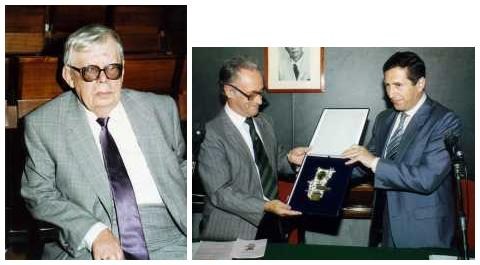Nikolai N. Bogolubov (1909-1992, posthumously)
Joint Institute for Nuclear Research, Moscow, Russian Federation
in recognition of his many fundamental contributions in physics and mathematics. In statistical physics, his treatment of Bose-Einstein condensation in a non-ideal gas was a seminal work which laid the basis for a microscopic theory of superfluidity in Helium II. It stimulated many of the later developments using quasi-particle methods. He later generalised this method to fermions and applied it to the phenomenon of superconductivity providing a systematic microscopic theory. The famous Bogolubov transformation is now a cornerstone of modern physics. In elementary particle physics, Bogolubov was the first to give a rigorous proof, based on local quantum field theory, of fixed angle dispersion relations for pion-nucleon scattering. This emerged from his study of the axiomatic basis of relativistic quantum field theory and the structure of the S-matrix. Another important result was a systematic formulation of the renormalisation programme for perturbative computations of the S-matrix. In mathematics, among his many important contributions we cite his work on non-linear mechanics and the general theory of dynamical systems.
Yakov G. Sinai, Landau Institute of Theoretical Physics, Moscow, Russian Federation (at the time of the award)
for his outstanding contribution to Theoretical Physics and Mathematics through the development of ergodic theory and its applications to dynamical systems, in particular billiards, phase transitions, quantum chaos and hydrodynamics. Also cited is his work on the spectral analysis of Schroedinger operators and applications of renormalization group theory.

















